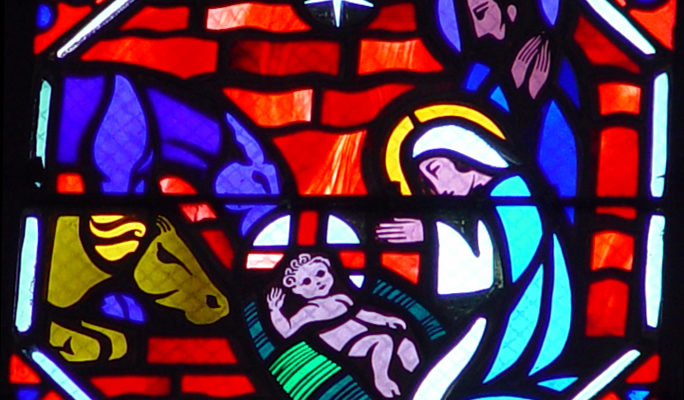This series of Advent devotionals is based on the themes of Advent, continuing with the theme of Love. For thisfifth, all of the Bible quotations are taken from the epistles of the New Testament.
Since Advent always begins with a Sunday, this set of devotions can be used any year! This does assume, however, that the New Year falls on Tuesday, as it did in 2018. You may need to modify this for your context.
First Sunday in Christmastide
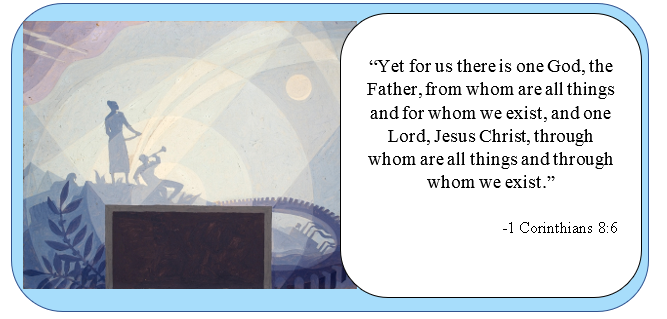
One
There is one God, the Father, one Lord, Jesus Christ, and one Spirit. All of creation comes from God – everything that exists was created through Christ. Paul doesn’t speak of the role of the Spirit in this passage, but we can see that all of God is involved in everything that God does. This oneness of God flies in the face of the mathematical certainty that one does not equal three. In this oneness, we can start to understand Jesus as the Christ. Christ means “the Anointed One” – it is the Greek word for the Hebrew Messiah. In perfect unity with God, the Messiah is the one who comes into the world, who delivers us from evil, who unites us, and builds an era of global universal peace. We will know this time when Christ comes again – when all creation will enter into the fullness of this renewal in harmony. As we follow Christ, we dedicate our lives to learning and living into that oneness that is and the oneness that comes into the world – even now.
Monday
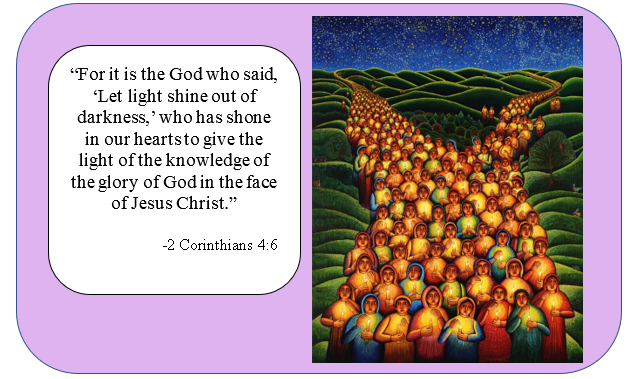
Shine
This single verse has such a superabundance of meaning! First, we find a celebration of God the creator – God who had only to speak and there was light in the darkness and chaos. The light that Paul is talking about is both the literal radiance of any beam of light as well as the figurative effects of light: wisdom suddenly understood, love felt warmly, care and attention, truth and safety. All of these lights that shine are gifts from God. Then Paul remembers that when Moses spoke to God on Mount Sinai, he was so surrounded by God’s glory that even Moses’s face began to shine! His face shone so brightly that he had to wear a veil around the Israelites! Paul says that God’s light has entered our hearts so that we can believe and understand that the glory of God shines through the face of Christ Jesus. The same glory that enlightened Moses streams from the Christ and fills our hearts. As you approach the New Year, be ready to let go of the darkness that would hold you back and receive the light that never stops shining.
Tuesday
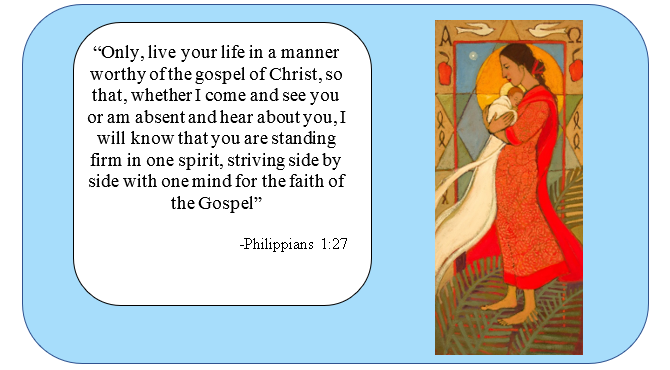
Faith
Happy New Year’s! Today is the day that many of us think about our hopes for the coming year and make resolutions that we rarely follow. This same optimism animates this verse from Philippians. Paul tells us, “just live in a way that is worthy of Christ.” Simply do that: pound for pound, everything you do should be totally worthy of who Christ is and what he did for us. Talk about pressure! Paul goes on to tell us what that would look like. Stand firm in one spirit – that means persevere in unity. Find what brings you together – the work that your shared faith points you to – and do that steadfastly. Then, he tells us to strive side by with our sisters and brothers – cooperate vigorously and joyously. Our faith in the Good News means that we can offer what we have and that God will work to turn it into what is needed. If you read this verse and think, “My life can’t be perfectly worthy! I’m gonna fight with other church members – that’s just what happens!” If this is your worry, then fear not! Our faith in the Gospel means that we trust God to bless our work, to forgive our failings, and to forge our future – now and always. So, be bold! Make resolutions and try to stick to them. But if you come up short, know that God will stoop down to where we are any time to get us where we are going. Hallelujah!
Wednesday
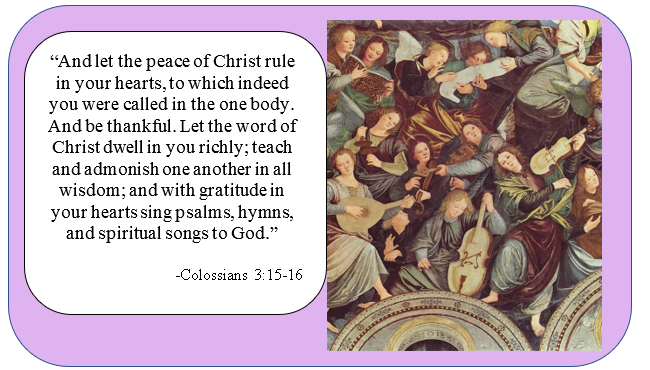
Sing
In gratitude, we can look at everything that our faith offers us: the peace of Christ, the fellowship of the church, words of wisdom and truth, and so much more. How else could we respond but with praise, with joy, with song! The translation above is a very good one, but the word order in Greek is a bit different. The end of verse 16 is literally, “with grace singing in your hearts to God.” I really like this alternate translation. When we find meaningful and powerful songs to sing, we can feel the grace singing in our own hearts. It is placed there by God, it grows and warms within us, and then we can freely share it through our songs and our love of others. The three categories of song listed are the Psalms (same ones we have now), hymns that are written and shared with the church, and spiritual songs to God. This last group is spontaneous singing – songs that have never been sung before that spring to our lips and flow out with praise and honor and glory. Paul doesn’t say only one type is good, only one type is pleasing to God. He says in gratitude we should sing and dance our way through all the ways we can enjoy and glorify God. In this New Year, feel free to explore new and different avenues of worship. As the psalms keep telling us: sing to the Lord a new song!
Thursday
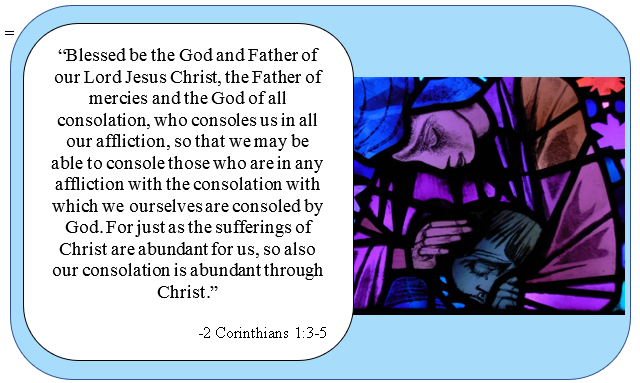
Abundant
Sometimes people are more comfortable with the intellectual side of faith – arguing about theology and doctrines, proving themselves right and righteous. But scripture tells us again and again that our God is a God not just of the mind, but also of the heart. God feels deeply, Christ cries and cries out for the sake of the people, and one of our names for the Spirit (paraclete) can be literally translated as “the Comforter.” In this passage, God is called, “the Father of mercies and the God of all consolation.” God is moved by compassion, by deep feelings in response to our suffering and hardship. That is why God responds so powerfully to our needs. As “God of all consolation,” we find a triune God who comes alongside us in our difficulty to comfort us, to soothe us, to offer us solace. This God who cares so abundantly for us as Father, Son, and Spirit, urges us to take what we learn from our hardships and become a refuge of peace for one another. Paul reminds us that Christ suffered much in his short life on earth – not just much, but abundant sorrows. Yet, Jesus chose to use his own pain to love us more. He was a man of sorrows, yet in his resurrection, he washed the earth with healing and new life. Never forget that abundance that holds you up and guides you on your way.
Friday
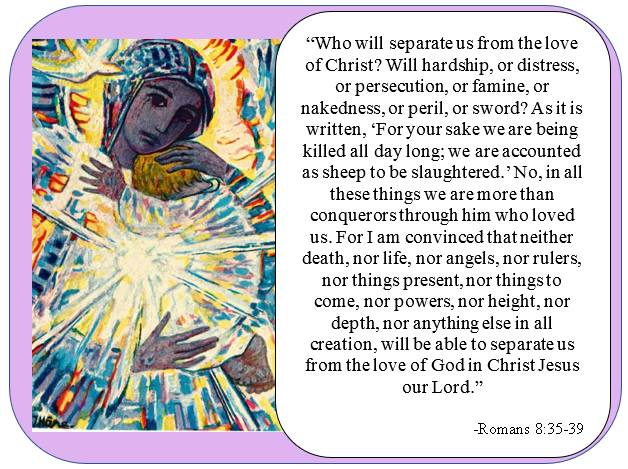
Love
It might seem strange to you that our focus word today is “love” since we had an entire week devoted to the topic of love. But how can we understand Christ without giving special focus to this agape love? This word is used so often for divine love (in contrast to human love, which can be fickle and inconsistent). This word holds the ideas of affection, benevolence, eternal care for all creation. It contains the notion of the divine will – in Christ, God makes known that love is who God is and what God chooses for everyone. In this well-loved passage from Romans, Paul makes it clear that this divine love is non-negotiable, irrevocable, and undeniable. Nothing that you can think of, nothing that you can do, nothing that you can break can stop this powerful love from going right on loving. In Christ we know eternal love and that means more than anything else.
Saturday
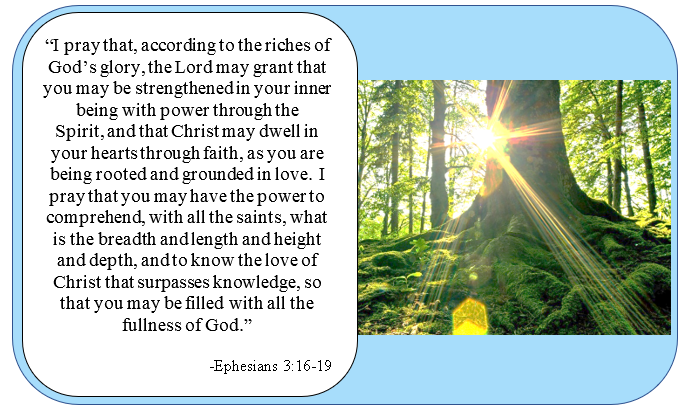
Rooted
Today we finish Christmastide and look forward to celebrating Epiphany. After the many weeks of preparation of Advent and our joyful “Gloria in excelsis deo” for Christmastide, it’s a good time to look back on how we have grown and where we would like to be going. Paul prays for the church in Ephesus that they would become stronger and more faithful, that they would understand what it means to know the love of Christ, and that they would feel filled and fulfilled in their almighty God. But the phrase I want to focus on is, “rooted and grounded in love.” Shakespeare once wrote, “what’s past is prologue.” Where we have been, the events that have shaped us and the lessons we have taken from them – this directs our steps in ways that we are sometimes unaware of. Paul reminds us to look to our foundations. Do we still have roots in toxic soil? Are we taking in poison, self-hatred, grudges, old wounds, jealousies, and pride? It is never too late to be rooted and grounded in love. It is never too late to prune away that which brings harm and to sprout delicate roots in new soil. In Christ, there is fertile soil beyond our imagining. And every day, he enriches our growth so that where it seemed impossible, even we can find tender new shoots springing forth and bearing fruit. Glory be to God who came and comes again. Glory to God in the highest!

